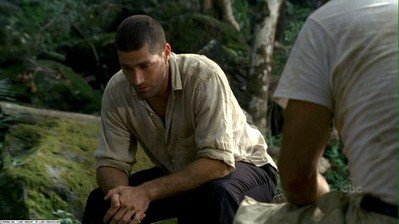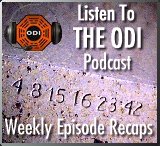Scene of the Week 1: Jack & Locke in White Rabbit
Jack and Locke Talk Alice in Wonderland

JACK: "I'm chasing something. Someone."
LOCKE: "Ah. The white rabbit. Alice in Wonderland."
JACK: "Yeah, wonderland, because who I'm chasing... he's not there."
LOCKE: "But you see him?"
JACK: "Yes. But he's not there."
White Rabbit is a classic S1 episode that helped set LOST's stage for future events. Within it, Jack and Locke share a three minute scene that sets up an ever-important motif: Science vs. Faith.
This is the 5th episode of LOST, and by now we've seen some pretty weird stuff. All of it however, can be attributed to the mysteries of the island. The monster in the jungle, Jack's father walking around... these things are unknowns - completely foreign to our Flight 815 survivors. But after this very important conversation between these two main characters, we learn something very important: John Locke knows a little bit too much.
LOCKE: "All right, then. You're hallucinating. But what if you're not?"
JACK: "Then we're all in a lot of trouble."
By this time, John's already had his run-in with the monster. Something about that encounter has changed Locke, and it's given him some very intimate knowledge of the island. Does he understand it fully? Not even close. During the scene, even John struggles a bit with the explanation. In talking to Jack, he's doing his own soul-searching here, trying to figure things out on the fly. But at the same time, Locke knows a lot more than he really should. It's as if something was awakened in John when he reached the island and began wiggling his toes again.
LOCKE: "I'm an ordinary man, Jack. Meat and potatoes, I live in the real world. I'm not a big believer in magic. But this place is different. It's special. The others don't want to talk about it because it scares them. But we all know it. We all feel it."
John calling himself an ordinary man was probably a red herring at this point. After watching five solid seasons of LOST, we know that Locke does some pretty extraordinary things. His kinship with the island seems based upon faith, and in early season one that faith was unwavering. The more John believed, the more things became. Whether it was hunting boar, throwing knives, or just the way he smirked whenever someone talked about the jungle... Locke was a step ahead of everyone for a very long time.
LOCKE: "Is your white rabbit a hallucination? Probably. But what if everything that happened here, happened for a reason? What if this person that you're chasing is really here?"

We got our first taste of destiny here, but at the time we were too busy to explore it. For the most part, we were preoccupied with counting instances of the numbers, dying for a glimpse of the monster, and staring at Shannon's legs. Locke's first use of the now infamous "Everything happens for a reason" line makes a lot more sense now that we've seen the struggle between Jacob and his adversary. But even way back during White Rabbit, we understood that there was deep significance behind Locke's words.
The second part of Locke's assertion here has an even bigger impact: that everything Jack is seeing is actually real. Locke sweeps aside hallucination in favor of reality, forcing us to question whether or not the vision of Christian Shephard is actually tangible. Jack would chase his father for the next several seasons, but never once would he catch him. Kate's horse... Hurley's friend Dave... these things stretched the limits of coincidence, but we never got to touch them. Slowly however, one by one, we started realizing that maybe these objects and people were actually there, and not just figments of the crash survivors' imaginations.
Even more concrete are examples of things people take for granted as "fact", like the Nigerian Beechcraft or the arrival of Anthony Cooper. Because these things can be touched and felt (and beaten and choked...), many viewers take their reality completely at face value. In Jack's world of science, impossibilities like this would be nothing more than hallucinations. But searching Locke's words, everything is "really here"... and here to accomplish a very specific task.
LOCKE: I've looked into the eye of this island. And what I saw was beautiful.
When White Rabbit aired, John's view of the smoke monster was all we had to go on. Later on however, we'd get glimpses of a darker and uglier version. Whether or not John saw the smoke monster - or something else entirely - should probably be up for debate. His interpretation of what it looked like simply doesn't jive with what we've seen so far, and after encountering the monster himself, Mr. Eko flat out disagrees with him.

JACK: Wait, wait, wait, where are you going?
LOCKE: To find some more water.
JACK: I'll come with you.
LOCKE: No. You need to finish what you've started.
JACK: Why?
LOCKE: Because a leader can't lead until he knows where he's going.
This last part of their conversation is even more revealing. Locke's refusal to take Jack along with him introduces what would be another long-standing LOST motif: characters having to do things for themselves. All throughout the show, we've seen choices that needed to be made without outside influence. We've seen help refused on the basis of making someone do something on their own. From Locke making Boone cut himself free of his bonds, to Christian Shephard refusing to help Locke to his feet, there's a long history of characters being forced to clean up their own messes and finish things of their own free will. Locke doesn't guide Jack here because he can't... and that's pretty important.
In all, this was one of LOST's most pivotal early scenes. It introduced a lot of themes that would later become an important part of the show, and even dictated a few rules about how the island worked. This was also the first time Locke tries chipping away at Jack's impenetrable armor. Eventually John would break through Jack's stubborn refusal to accept anything other than science, forcing Jack far enough down the path of faith that he's even the first person to push the button in the Swan hatch.
None of this of course, explains the Jack/Locke tickle fight.


